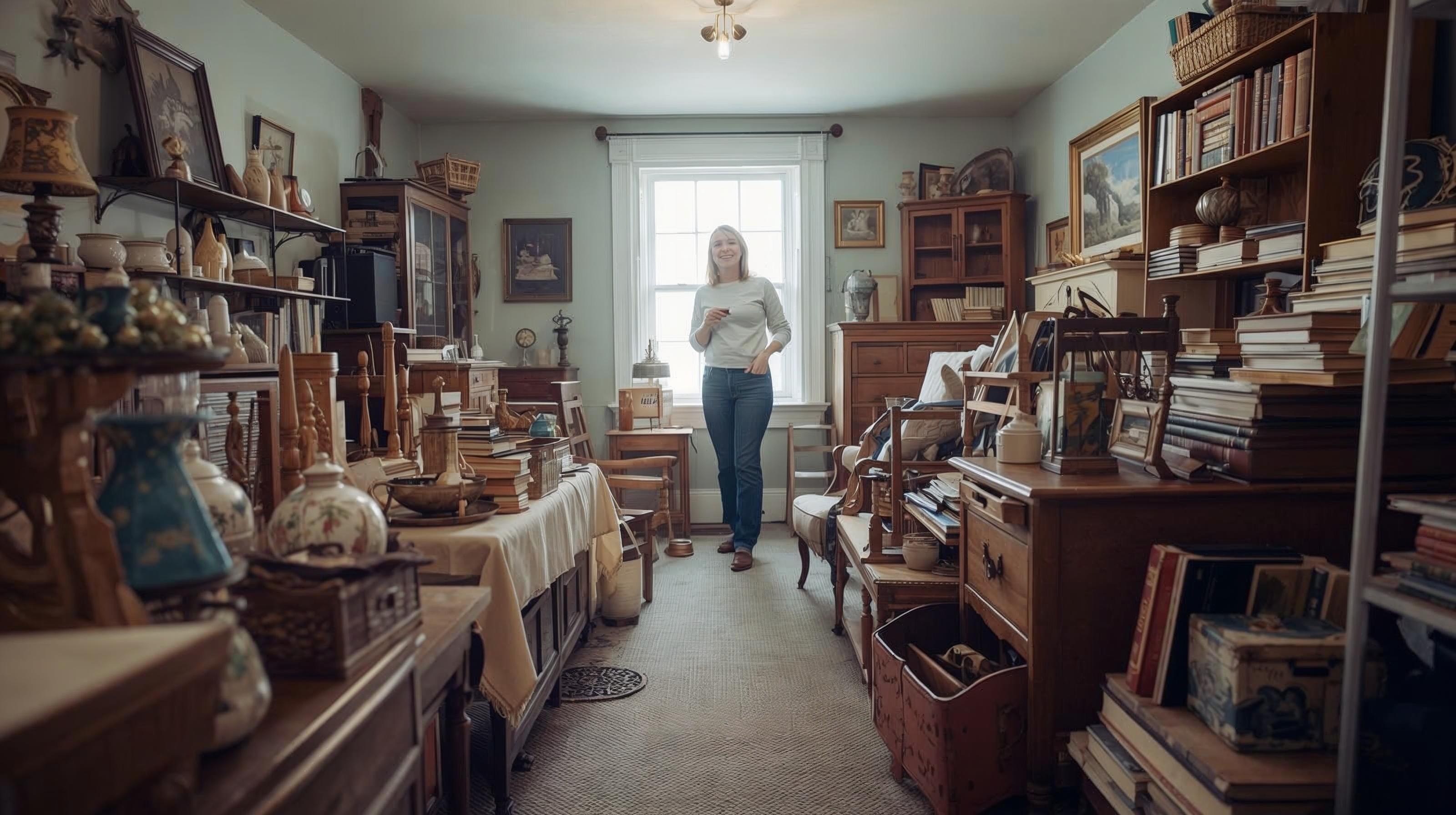Key takeaways
Running a Bay Area estate sale yourself is possible, but it’s a real project—not a weekend task. Success depends on planning, pricing, staging, and marketing just as much as the sale days themselves.
The biggest drivers of results are preparation and pricing, not the number of people who show up. Well-organized sales with realistic prices consistently outperform cluttered or over-priced ones, even in high-demand areas.
The main risk of DIY estate sales isn’t “leaving money on the table”—it’s burnout, time drag, and stress during an already emotional transition. For many families, knowing when to DIY and when to bring in help is the real leverage point.
Summary: DIY estate sales can work in the Bay Area, but they require significant time, organization, and emotional energy—so clear planning and realistic expectations matter more than squeezing out every last dollar.
If you’ve ever wandered through an estate sale, you know the feeling: a mix of curiosity, nostalgia, and the excitement of stumbling onto a treasure. For the family running the sale, though, it’s usually less about discovery and more about logistics, emotions, and hard work. Estate sales are often misunderstood as something that happens only when someone has passed away, but the reality is quite different. In the Bay Area especially, where downsizing and relocating are common, people turn to estate sales for all sorts of reasons — from clearing out a lifetime’s worth of belongings before moving into a senior living community, to decluttering ahead of a big move, or simply because a family wants to cash in on furniture, art, or collectibles that no longer serve them.
An estate sale is essentially the liquidation of most or all the contents of a home. Unlike a yard or garage sale, which is usually limited to household odds and ends, an estate sale often involves the whole spectrum of possessions: furniture, artwork, jewelry, electronics, collectibles, kitchen goods, and even clothing. The scope is broader, the stakes are higher, and the potential proceeds are significant. But the big decision every family faces is whether to hire professionals or attempt to do it themselves.
When to Hire Professionals and When to DIY
Professional estate sale companies exist because the process is not as simple as it looks. Pricing, advertising, staging, and running the actual event are demanding tasks. In the Bay Area, most companies charge a percentage of the sales proceeds — often in the 30 to 40 percent range. That fee can feel painful, but what you’re paying for is expertise and convenience. If the estate contains high-value items like fine art, antiques, or jewelry, it usually makes sense to bring in professionals who know how to price and present these pieces. Hiring a company also makes sense if you lack the time, physical stamina, or emotional energy to manage the process. It’s particularly useful when family members live far away or when there are conflicts about what things are worth.
On the other hand, if most of the items are everyday goods such as furniture, small appliances, clothing, or tools, and you have both the time and willingness to put in the effort, you may be better off doing it yourself. By managing it on your own, you keep a much larger share of the proceeds and maintain control over the process. For some families, a hybrid model works best: they handle the majority of the sale but bring in experts for appraisals, advertising, or specific categories of items where specialized knowledge is needed.
Why It’s Harder to Do Alone
Running your own estate sale seems straightforward in theory: put items out, set prices, and let people shop. In reality, it’s much more complex. Pricing is often the biggest stumbling block. Most people don’t know whether a set of china should be priced at twenty dollars or two hundred. Sentimental attachment makes this even harder because sellers naturally want to assign higher value to things with personal meaning.
Promotion is another challenge. Without proper advertising, even the most carefully staged sale can flop. Getting the word out on platforms like EstateSales.net, Craigslist, and local Facebook Marketplace (and buy/sell Facebook groups) takes time and effort. Then there’s the actual work of staging, negotiating with buyers, and handling payments. Crowds can be large, haggling is relentless, and safety is a concern when strangers are walking through the home. All of this explains why many people who try to manage an estate sale alone end up feeling overwhelmed.
Bay Area Companies That Can Help
If you want to retain control but still have some professional support, there are several options in the Bay Area. Companies like Blue Moon Estate Sales in San Jose offer both full-service sales and consulting for families who want help with pricing and promotion. Caring Transitions, with multiple Bay Area offices, focuses on senior downsizing and can assist with online auctions for those who prefer not to host a public sale at home. Grasons Co. has offices across the Peninsula, East Bay, and South Bay and is known for offering flexible services, including appraisals and partial estate management.
There are also hybrid platforms like MaxSold, which let you photograph items yourself and then run an online auction on your behalf. If you believe you have valuable art, jewelry, or antiques, auction houses like Michaan’s in Alameda can provide professional appraisals and access to serious buyers. These companies don’t necessarily need to take over the entire process — they can simply fill in the gaps where you need expertise.
Best Practices for Running a DIY Estate Sale
If you decide to go it alone, the first step is organization. Separate what will be kept from what will be sold, donated, or discarded. The clearer the boundaries, the easier it will be for buyers to understand what is available. Clean items thoroughly and stage them attractively; presentation makes a big difference in how much people are willing to pay.
Pricing should be based on research rather than guesswork. Look up comparable items on eBay and check the “sold” listings to see what buyers are actually paying. Facebook Marketplace and Craigslist are also good barometers of local demand. For anything you suspect may be particularly valuable, consider hiring an appraiser, even if only for a few hours. Spending a little money here can save you from accidentally underselling a piece of art or jewelry.
Selling online can supplement or even replace a traditional in-person estate sale. Facebook Marketplace is especially strong for bulky furniture and electronics since buyers can arrange local pickup. Craigslist continues to have traction in the Bay Area, especially for furniture and household items. eBay is best for collectibles, designer goods, and anything you’re willing to ship. Nextdoor is growing in popularity for hyperlocal sales, while apps like OfferUp cater to a younger demographic. If you want less hassle, platforms like Everything But The House or MaxSold let you handle the photography while they manage the actual auction and transactions.
If you do host a public sale at the property, advertising is crucial. Websites dedicated to estate sales will get your listing in front of serious buyers. Craigslist, Nextdoor, and local Facebook buy-and-sell groups can add reach. Don’t underestimate the power of old-fashioned signage either — clear, simple signs with arrows and dates placed around the neighborhood can bring in a steady stream of shoppers.
Safety is also essential. Keep valuables and sensitive documents locked away, and restrict access to certain rooms of the house. Accepting electronic payments like PayPal, Venmo, or Square reduces the risks associated with handling large amounts of cash. Have at least two people present at all times to deter theft and to manage crowds.
What Are Items Worth?
One of the hardest realities for families is recognizing the difference between retail value and resale value. That couch you paid $2,500 for might fetch only $150 today. Dining room sets often sell in the $200 to $1,500 range depending on style and condition. Electronics depreciate quickly; a high-end television from a decade ago may be worth only fifty dollars. Art is highly unpredictable: unless an artist has gained a following, a painting purchased for thousands of dollars might sell for a fraction of that price.
That said, there are categories where value holds up or even increases. Jewelry, collectibles, vintage designer goods, and certain types of mid-century furniture can command strong prices, especially in a market like the Bay Area where buyers are savvy and willing to pay for quality. The best way to avoid surprises is to use professional appraisers for anything you suspect may be valuable. They can authenticate items and give you confidence that you’re setting fair prices.
Staying Safe and Avoiding Scams
Unfortunately, estate sales can attract not just bargain hunters but also opportunists. Protect yourself by never meeting buyers alone for large transactions, especially if you’re selling through online platforms. Whenever possible, meet in public places for small items, and invite a friend or family member to be present for bigger ones. Counterfeit bills remain a problem, so electronic payment is usually safer. Be on the lookout for early shoppers who try to sneak in before the official start time, and keep a close eye on small valuables like watches and jewelry.
How Much Can You Expect to Make?
The proceeds from an estate sale vary widely. A modest sale with everyday items might bring in a few thousand dollars. A home filled with antiques, collectibles, and high-end furnishings could easily generate tens of thousands. The final number depends on the mix of items, their condition, and the effort you put into pricing, staging, and advertising. While most families will not make back the full amount originally spent on household goods, the money earned can still be substantial, and just as importantly, it clears the way for the next stage of life — whether that’s selling the home, moving, or simply enjoying a less cluttered environment.
Final Thoughts
Running your own estate sale in the Bay Area can be rewarding both financially and emotionally, but it’s not without challenges. For some families, hiring professionals is the only realistic option. For others, the do-it-yourself approach works fine, especially when combined with online platforms that broaden the pool of potential buyers. A hybrid strategy often makes the most sense: handle what you can, then bring in professionals where you need specialized expertise.
The most important things to remember are to plan thoroughly, set realistic expectations about value, and keep safety at the forefront. At the end of the day, an estate sale isn’t just about squeezing every last dollar out of belongings. It’s about creating closure, simplifying transitions, and making room for the next chapter.
Frequently Asked Questions
What is an estate sale?
An estate sale is the liquidation of most or all of a home’s contents. Unlike a yard sale, it usually includes a broad range of items—furniture, artwork, jewelry, electronics, collectibles, kitchen goods, and clothing—and is typically run as a structured event (or auction) designed to clear a home and generate proceeds.
Do estate sales only happen after someone passes away?
No. Estate sales are often used for downsizing, relocating, decluttering before a move, or cashing in on belongings that no longer fit the next stage of life—especially common in the Bay Area where transitions and right-sizing happen frequently.
When should a family hire an estate sale company instead of doing it themselves?
Hiring professionals usually makes sense when the estate includes high-value categories (fine art, antiques, jewelry), when the timeline is tight, when family members are remote, or when the physical and emotional workload would be too heavy. Companies can also help reduce conflict when people disagree about value.
When does a DIY estate sale make the most sense?
DIY can work well when the contents are mostly everyday goods (standard furniture, small appliances, clothing, tools) and you have the time and willingness to organize, price, market, and run the sale. The upside is keeping more of the proceeds and maintaining control.
Why is it harder to run an estate sale yourself than it looks?
The toughest parts are pricing (especially with sentimental attachment), promotion (so the sale doesn’t flop), staging, managing negotiations, handling payments, and keeping the home secure while crowds move through the property.
How should we price items for a DIY estate sale?
Price based on research, not guesswork. Use eBay “sold” listings to see what buyers actually pay, and check Facebook Marketplace and Craigslist for local demand. For anything you suspect is valuable, consider hiring an appraiser for a short consult so you don’t accidentally underprice art, jewelry, or collectibles.
Where should we advertise a Bay Area estate sale?
Advertising is crucial. Common channels include estate-sale listing sites, Craigslist, Nextdoor, Facebook Marketplace, and local buy/sell Facebook groups. Simple neighborhood signage (clear arrows, dates, and times) can also drive strong turnout.
Should we sell some items online instead of (or in addition to) an in-person sale?
Yes—online selling can supplement or replace an on-site sale. Facebook Marketplace and Craigslist can be strong for bulky items like furniture and electronics; eBay can work well for shippable collectibles and designer goods; and platforms like MaxSold or Everything But The House can run auctions while you handle photos and basic prep.
What are some Bay Area companies that can help if we don’t want full-service estate sales?
If you want support without giving up full control, there are companies that offer consulting or hybrid help. The article mentions Blue Moon Estate Sales (including consulting), Caring Transitions (often focused on senior downsizing and online auctions), Grasons Co. (flexible services), MaxSold (online auction platform), and Michaan’s in Alameda for appraisals and access to auction buyers for higher-value categories.
How do we stay safe and avoid scams during an estate sale?
Lock up valuables and sensitive documents, restrict access to certain rooms, and have at least two people present at all times. Electronic payments (Venmo, PayPal, Square) reduce the risk of handling lots of cash. Watch for early shoppers, keep a close eye on small valuables, and don’t meet buyers alone for large transactions.
What are items typically worth at an estate sale?
A key reality is that resale value is usually far below retail. Many big-ticket household items depreciate heavily over time. Some categories hold value better—jewelry, collectibles, vintage designer goods, and certain mid-century furniture—so research and (when needed) appraisal help prevent unpleasant surprises.
How much money can we expect to make from a Bay Area estate sale?
It varies widely. A modest home with everyday items might generate a few thousand dollars, while homes with antiques, collectibles, and high-end furnishings can produce tens of thousands. Outcomes depend on the mix of items, condition, and the effort put into pricing, staging, and marketing.
What’s the biggest takeaway if we’re deciding between DIY and professional help?
Think in terms of tradeoffs: professionals cost a meaningful percentage but bring expertise and convenience; DIY keeps more proceeds but requires significant time, organization, and emotional bandwidth. A hybrid approach—DIY most items while using experts for appraisals, promotion, or high-value categories—often strikes the best balance.
Amazing Mountain View Homes for Sale
2
3
4
5
6
7
8
9
10
11
12
13
14
15
16
17
18
19
20
21
22
23
24
25





